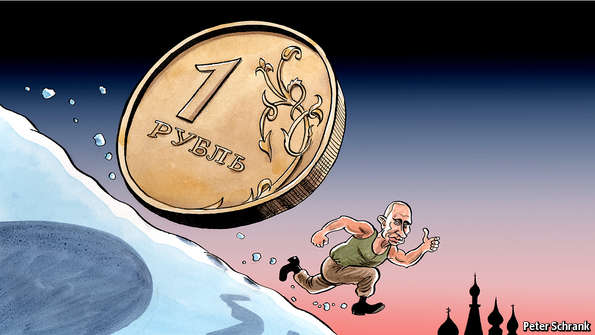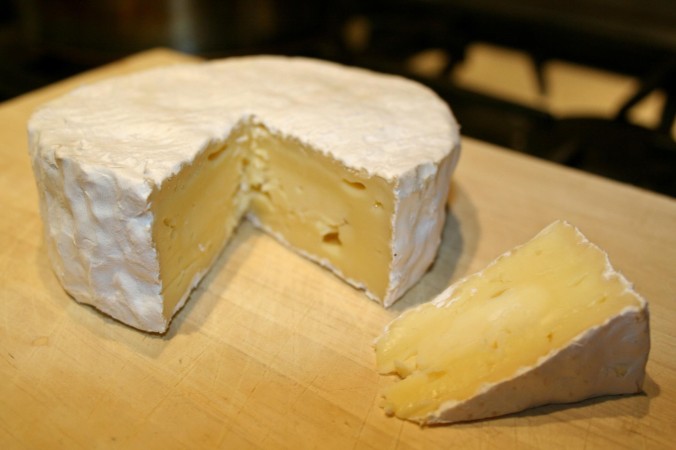
Russia and Putin running scared? (Via Economist)
It can be said that Russians are optimistic on the whole, and their sheer perseverance has got them through political turmoil past and present. The international community has had its own perseverance tested during the teething stages of the Ukraine Crisis, even when many of Russia’s ‘adversaries’ had to decide how to react after the swift annexation of Crimea. Economic and travel sanctions seemed like the fitting punishment, and such action not only agitated the oligarchical elite, but also caused the Ruble to spiral into collapse. While the economic flexibility of Russia may have been hindered, the impact on your average citizen has been somewhat negligible.
The deflation of the Rouble has affected people rather selectively. If you happen to be a well-paid middle class professional working in Moscow, then perhaps your standard of living might not be what it used to be, but for the majority of Russians, sanctions are a mere inconvenience. While the different valuation of the Rouble may not be able to buy much abroad, such inflation has encouraged greater self-sufficiency within the country itself. Camembert is one such delicacy that Russia is struggling to import from France. Whilst before the sanctions hit, this French delicacy was relatively easy to import and highly affordable, however the economic situation has led to Camembert production spring boarding in Russia’s arctic east- Siberia.

Russians are utilising greater self-sufficiency to tackle E.U import sanctions.
US and E.U sanctions have damaged trading links with the rest of Europe, pushing Russia to pursue greater economic opportunities with China in particular. This alignment can be exemplified with the strengthening of the Shanghai Pact, as well as the trading block within the Eurasian Economic Community. The Irony of the situation is- Europe needs Russia, and the Kremlin itself has always seen Europe as its natural trading partner in the 21st century, however the European Union will not allow this. Putin has had little choice but to hitch his wagon to a richer part of the world with higher growth rates and business prospects, much to the detriment of the rest of Europe.
While we can admit that the sanctions have created a rather large investment gap in the Russian economy, China has quite comfortably filled this in with ease. Prolific development deals have taken place between the two countries, such as a $400bn deal to supply petroleum, sales of military aircraft, as well as talks of a $230bn high speed railway link between Moscow and Beijing.

Sino-Russian relations are reaching new horizons- could these economic sanctions be a blessing in disguise?
In retrospect, the collapse of the Soviet Union in the early 1990’s led to the Kremlin ‘going west’ for economic and diplomatic nourishment. The contradiction in foreign policies over the past 15 years however, has caused such a relation to decay. Unable to conform to the European Union’s expectations or wishes, Russia has now turned towards China, only to find itself in a more favourable relationship then what it had before. The history of Sino-Russian relationships has generally been a rocky one, going from communist camaraderie in post-war Asia, to the frosty Sino-Soviet split occurring in the 1960’s largely due to ideological differences. In a post-Cold War world- it can be argued that both of these countries have struggled somewhat to find their place on the world stage in terms of diplomacy and international relations.
Now that the dust has settled and the economic climate has warmed, both Russia and China are seizing an important opportunity in a very multi-polar world. The European Union now has little choice but to diversify its trading partners outside the Eurocentric spectrum, as the economic competition between themselves and the emerging Eurasian trading block will only intensify in the near future. Just to reiterate once again, Russia needs Europe, and Europe needs Russia. To push away such a relationship through stern economic and politically motivated sanctions will only push the Kremlin to forge stronger ties with more stable, flexible and more prosperous nations such as China.
By Stuart Chapman, Junior Writer for Daily Political View.
Twitter: (@SP_Chapman)
Further reading:
Was really interesting to read a viewpoint of professional, even he is ‘just’ ‘junior’.
I’m from a little country called Hungary which is due it’s geographic position depend on Russia, and yes, we buy the gas from them too. Which has been reduced as Russia was going to make a presser on Ukraine. We are in the middle, between east and west, and can’t explain how hard to make a balance.
Would be really interesting to read a professional’s opinion about this question too! 🙂